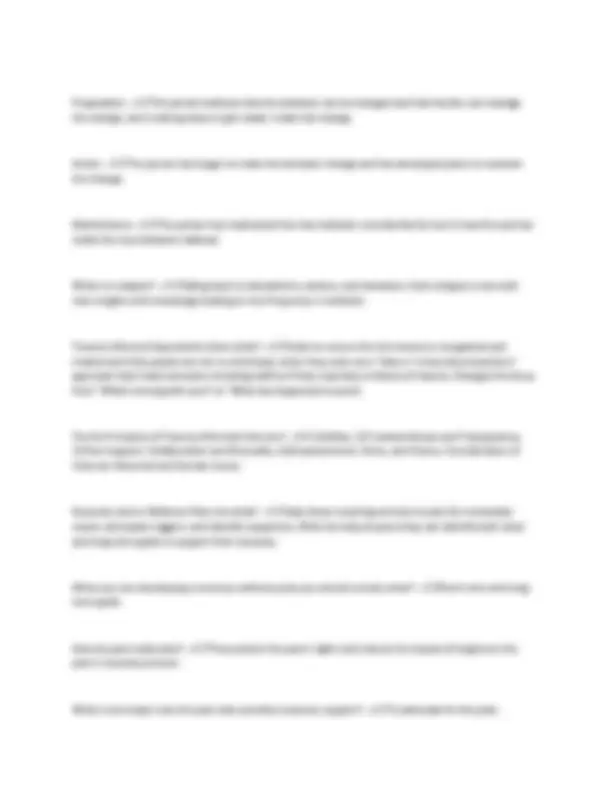





Study with the several resources on Docsity

Earn points by helping other students or get them with a premium plan


Prepare for your exams
Study with the several resources on Docsity

Earn points to download
Earn points by helping other students or get them with a premium plan
Community
Ask the community for help and clear up your study doubts
Discover the best universities in your country according to Docsity users
Free resources
Download our free guides on studying techniques, anxiety management strategies, and thesis advice from Docsity tutors
Recovery - ✔✔A process of change through which individuals improve their health and wellness, live a self-directed life, and strive to reach their full potential. SAMSHA - ✔✔Substance Abuse and Mental Health Service Administration Personal Recovery - ✔✔What people experience themselves as they become empowered to manage their mental illness and or substance use disorder in a manner that allows them to achieve a meaningful life and a positive sense of belonging in their community. 4 Dimensions of Recovery - ✔✔Health, Home, Purpose, and Community Health Dimension - ✔✔Managing ones disease(s) as well as living in a physically and emotionally healthy way.
Typology: Exams
1 / 6

This page cannot be seen from the preview
Don't miss anything!




Recovery - ✔✔A process of change through which individuals improve their health and wellness, live a self-directed life, and strive to reach their full potential. SAMSHA - ✔✔Substance Abuse and Mental Health Service Administration Personal Recovery - ✔✔What people experience themselves as they become empowered to manage their mental illness and or substance use disorder in a manner that allows them to achieve a meaningful life and a positive sense of belonging in their community. 4 Dimensions of Recovery - ✔✔Health, Home, Purpose, and Community Health Dimension - ✔✔Managing ones disease(s) as well as living in a physically and emotionally healthy way. Home Dimension - ✔✔A stable and safe place to live. Purpose Dimension - ✔✔Meaningful daily activities such as a job, school, volunteerism, family caretaking, or creative endeavors, and the independence, income, and resources to participate in society. Community Dimension - ✔✔Relationships and social networks that provide support, friendship, love, and hope. Peer Recovery Support - ✔✔An individual or family member who has lived experience with a mental illness and or addiction to alcohol and/or other drugs, and has also completed formal training who provides one to one strength-based support to peers in recovery.
Four Goals of Recovery Support - ✔✔Encourage hope, optimism, and healthy living, remove barriers, promote recovery, and connect people with recovery support services. Four Domains of Peer Support - ✔✔Advocacy, ethical responsibility, mentoring and education, and recovery/wellness support. 4 types of support offered by Peer Recovery Supports - ✔✔Emotional Support, Informational Support, Instrumental Support, and Affiliational Support. Emotional Support - ✔✔Demonstrate empathy and caring, foster self-confidence. Infomational Support - ✔✔Provide health and wellness information as well sd information about community health and social services. Instrumental Support (tangible support) - ✔✔Provide concrete assistance in accomplishing tasks, such as help to obtain child care, employment or access to community health and social services. Affiliational Support (support in building relationships) - ✔✔Promote social connections and engagement in community. Iatrogenic - ✔✔Actions taken with the best of intentions that result in harm or injury. Fiduciary - ✔✔Describes relationships in which one party has assumed a special duty and obligation to the other party. Fiduciary implies that one party enters with increased vulnerability requiring the objectivity, support, and protection of the other party. Multi-Party Vulnerability - ✔✔Refers to how multiple parties can be affected by unethical behavior. Boundary Manager - ✔✔Involves those decisions that determine the Lebel of intimacy and parameters in a relationship.
Preparation - ✔✔The person believes that the behavior can be changed and that he/she can manage the change, and is taking steps to get ready t make the change. Action - ✔✔The person has begun to make the behavior change and has developed plans to maintain the change. Maintenance - ✔✔The person has maintained the new behavior consistently for over 6 months and has made the new behavior habitual. What is a relapse? - ✔✔Falling back to old patterns, actions, and behaviors. Each relapse is met with new insights and knowledge leading to less frequency in setbacks. Trauma Informed Approaches does what? - ✔✔Seeks to ensure the the trauma is recognized and treated and that people are not re-victimized, when they seek care. Takes a "universal precautions" approach that treats everyone including staff as if they may have a history of trauma. Changes the focus from "What's wrong with you?' to "What has happened to you?). The Six Principles of Trauma Informed Care are? - ✔✔1.)Safety, 2.)Trustworthiness and Transparency, 3.)Peer Support, Collaboration and Mutuality, 4.)Empowerment, Voice, and Choice, Consideration of Cultural, Historical and Gender Issues. Recovery and or Wellness Plans do what? - ✔✔Help those receiving services to plan for immediate needs, anticipate triggers, and identify supporters. With the help of peers they can identify both short and long term goals to support their recovery. When you are developing a recovery wellness plan you should include what? - ✔✔Short term and long term goals. How do peers advocate? - ✔✔They protect the peer's rights and reduce the impact of stigma on the peer's recovery process. What is one major role of a peer who provides recovery support? - ✔✔To advocate for the peer.
Advocacy is intended to? - ✔✔Promote the dignity of and the reduction of stigma against peers/consumers. What are SAMSHA's four dimensions of recovery? - ✔✔Health, home, purpose and community. Stigma can clearly bye defined as? - ✔✔The experience of being deeply discredited due to one's undesired differentness. You would be creating a boundary violation if you? - ✔✔Accept an expensive gift from a peer. What best describes a peer who provides recovery support? - ✔✔An individual with lived experience with a mental illness and/or addiction to alcohol and/or other drugs who has completed formal training to provide support to peers in recovery. Professional Development is: - ✔✔An ongoing process to update skills and knowledge. One major role of peer recovery support is to: - ✔✔Serve as and advocate. How would you best describe a person with co-occuring disorders? - ✔✔A person living with both mental illness and substance use disorders. When you are using motivational interviewing as a peer support technique you should... - ✔✔Listen, support, and promote self-efficacy. A benefit of sharing your recovery story is to: - ✔✔Support change and show recovery is possible. Peer support is not what? - ✔✔Judgemental An example of a recovery-oriented approach is? - ✔✔Focusing on wellness, ability and choice.